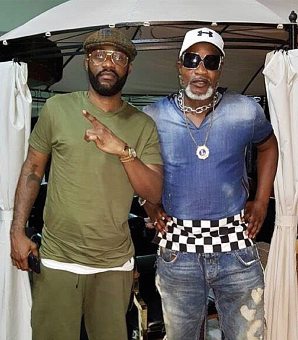The Eagle of Kinshasa

Little Faustin Ipupa Nsimba has come a long way in forty-six years. Born on 14 December 1977 into a large family in Kinshasa, he grew up in the Bandalungwa neighbourhood home of legendary group Wenge Musica, kings of soukous. At the time, rumba and dance rhythms chanted in Lingala were all the rage in the capital. He sang in church with his mother and sister, and played congas and guitar. He admired his musical elders: Franco, Tabu Ley Rochereau, Lokua Kanza, and also George Benson. He soon began playing in street bands, despite his father's disapproval. Until the day he was spotted by Ivorian producer David Monsoh, who introduced him to rumba star Koffi Olomidé. Olomidé made him a member of his group Quartier Latin, where he stayed for seven years. He danced, sang and took on the nickname Anelka (like the footballer). He went on to make six albums with Olomidé. And then, in 2006, it all came to an end. He left Koffi to strike out on his own, sending shockwaves through the Congolese rumba scene. At the time, no one was betting on the young protégé who chose to break free, incurring the wrath of his mentor. But the title of Fally Ipupa's debut album, released the same year, was a harbinger of things to come: Droit Chemin (Right Path).
The rest is history. The rise of L'Aigle (the eagle), also known as DiCap la Merveille (the singer is a Leonardo DiCaprio aficionado), and l'Empereur 200K (in reference to the 200 million streams garnered by his latest album) has been dizzying. His fourth solo album, Tokooos, released in 2017, was certified a gold record in 2022 by SNEP, France's national syndicate of phonographic publishing. A historic first for a Congolese artist. Fally has succeeded in bringing rumba out of the Kinshasa ‘ghetto’ by mixing it with urban sounds. He has invited international stars to guest on most of his albums, including France's Booba and M. Pokora and Nigeria's Wizkid. He mixes Lingala, French and English. The result is smash-hit afropop, a mix of recurring melodic love songs and frenzied rhythms that's got people all over the world dancing.
DETERMINATION AND COMMITMENT
Another key to Fally's success, say those in the industry, is his hard-working nature. It's true that Fally has been performing concerts and touring the world at a relentless pace. In Paris, after debuting at the Olympia and the Zénith, he performed at the Paris La Défense Arena in November 2023, before a 40,000-strong crowd. He has toured Chad, Zambia, Angola, South Africa, Nigeria, Côte d'Ivoire, Cameroon, Gabon and Niger, as well as Denmark, Dubai and London. He is also set to tour the United States in early November. He has brought Congolese rumba, which will be added to UNESCO's Intangible Cultural Heritage list in 2021, into the realm of world music. But what makes Fally special is that, despite his worldwide success, he remains profoundly Congolese. He spends as much time in Paris as he does in Kinshasa, where he has his studio and the Fally Ipupa Foundation, which works to support disadvantaged mothers. Since 2018, he has been a goodwill ambassador for the UN Mission in Congo (MONUSCO), combating the recruitment of children by armed groups in the DRC.
In Kin, he is a superstar, so much so that his shows sometimes end in drama, because there is so much jostling and pushing in the audience. A case in point is the Stade des Martyrs [see box]. On 16 August last year, a concert scheduled in Goma had to be cancelled because the police were unable to guarantee the star's safety and that of the audience... Because in the DRC, rumba stars are idolised. People follow them on the Internet, which exposes their quarrels and jealousies. For example, the ongoing strained relations between Koffi Olomidé and Fally, despite some photos in which both pretend to play nice. At a press conference in Paris in 2023, Fally said: "I'm still burning with ambition, as if I haven't achieved anything!" In view of the amazing career he has already accomplished, we can therefore expect to see further feats. To the delight of his fans.